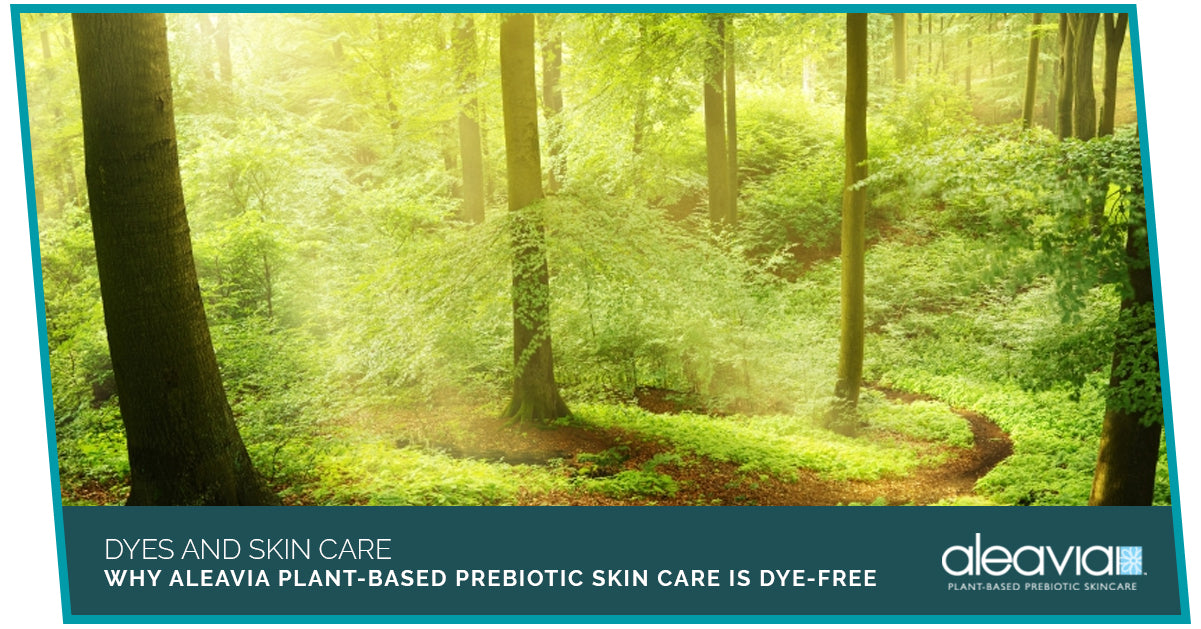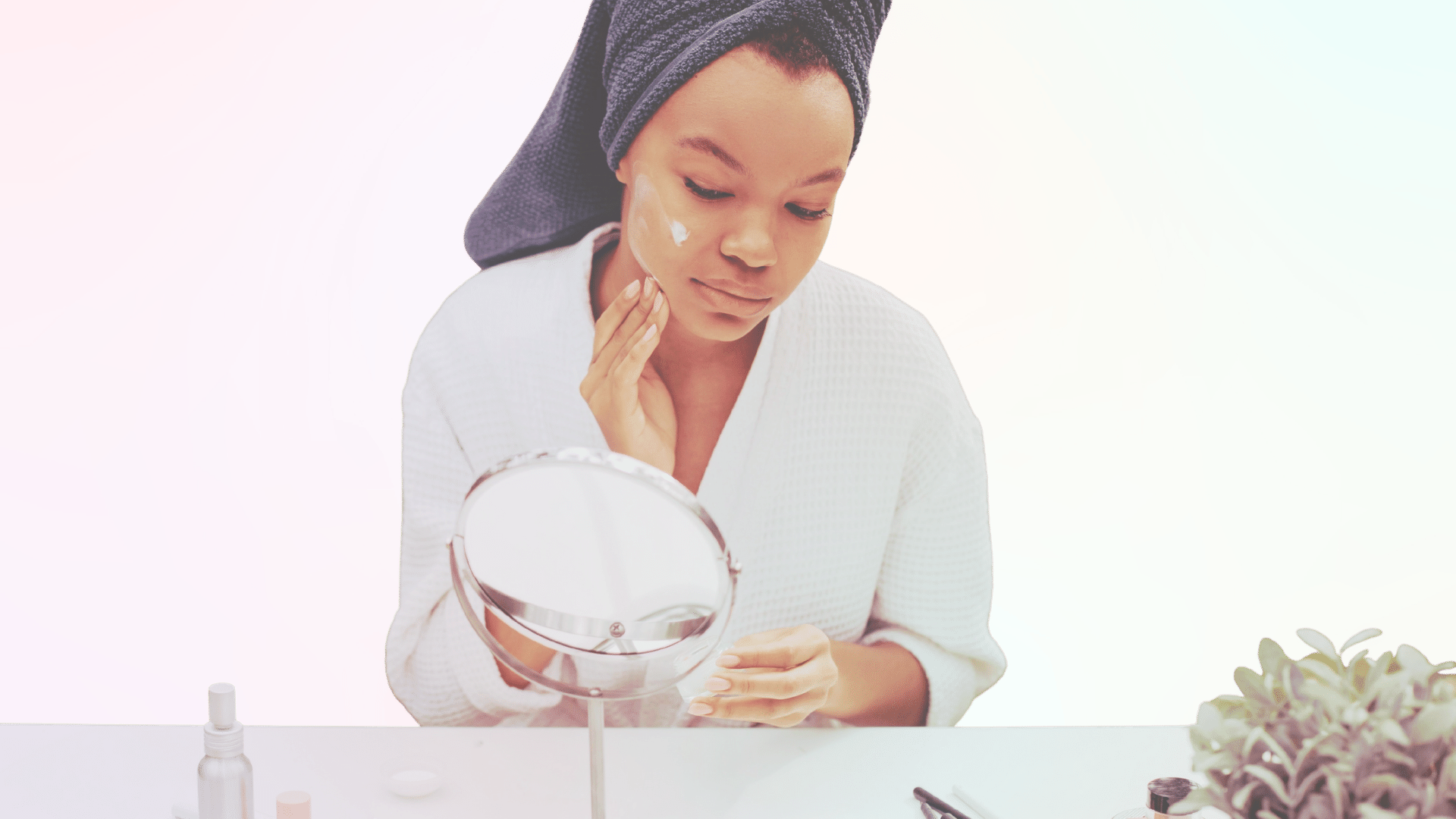
It’s tough to know which companies you can trust, and which organizations are more concerned with the bottom line than actually providing the best for their customers. While this trend extends well beyond that of the world of cosmetics and skin care, we like to stick to what we know here at Aleavia Plant-Based Prebiotic Skincare, so we’ll be sticking with the cosmetic and skin care industry for the purposes of today’s post.
Today’s post concerns dyes. They are found in skin care and cosmetic products all over the place, and have been for some time. At this point, dyes are so common and most people find it difficult to care about everything they put in or on their body, that dyes get the short end of the stick when it comes to consumer-awareness. Later on in today’s post, we’ll highlight what folks need to know about dyes before explaining why Aleavia and our organic skin care brand carries exclusively dye-free skin care products.
But before we get caught up in the whirlwind negatives and fears, let’s talk about something positive — organic, prebiotic skin care!
The Power Of Prebiotics
We’ve said it in posts of the past, and we’ll continue to spread the groundbreaking news that has to do with prebiotic skin care. Simply enough, prebiotics are essentially “superfoods” which nourish the skin. More specifically, prebiotics refer to fibrous ingredients that feed the beneficial bacteria found on your skin. Not to be confused with probiotics, which refer to ingesting the necessary bacteria themselves, prebiotics feeds into what the good microbes on your skin are already doing well, whereby the negative, harmful microorganisms are starved out.
The effect? A more balanced skin pH. Cellular restoration. The repairing of wounds, scars, and blemishes. Increased collagen production. Making your skin appear younger and fresher. Hyaluronic acid production increases, which strengthens the ability of the skin to keep moisture locked in. Common skin problems like eczema, rosacea, acne, psoriasis, and more can often be solved with the power of prebiotics.
With just seven pure, organic ingredients used in our products, we have found that a return to natural simplicity is the answer to many of the modern skin issues folks are faced with today. Below you’ll find a description of each of the aforementioned ingredients found in our vegan skin care products:
- Organic Acadian Sea Kelp - anti-aging, detoxifying, and nutrient-rich properties
- Organic Extra Virgin Coconut Oil - organic extra virgin coconut oil affords users to heal, protect, and moisturize
- Organic Aloe Vera - receive soothing, anti-inflammatory, and hydrating properties through organic aloe
- Dead Sea Salt - nutrient-rich, calming, anti-aging organic plant glycerine both softens and soothes skin for intrinsic and aesthetic value
- Citric Acid - a skin brightener, primarily; citric acid balances your skin’s pH levels
- Organic Soy Lecithin - non-GMO (of course) and antioxidant-rich to moisturize and soften your skin
The Aleavia Promise
Aleavia Skin Care uses a combination of 100 percent natural, organic and environmentally-safe ingredients. Aleavia is non-toxic, biodegradable, sulfate and sulfite-free, non-GMO, vegan and cruelty-free, and free from all artificial fragrances, dyes, and parabens.
“New Holy Grail Natural Product"
“Changed my skin almost overnight!!! I have tried A LOT of skincare products in my life. I have sensitive and dry skin. Nothing has worked this well this fast. I have had this bottle for 2 weeks and have almost completely clear skin. All that is left are my acne scars which have significantly reduced! Loved it so much I bought the holiday travel trio on their website directly. Don’t hesitate to make this purchase. You won’t regret investing in a non-toxic wash that lives up to the claims.” - Amazon Verified Purchaser, Five Stars
As you can tell, there is a beauty to the simplicity with which we’ve formulated our prebiotic skin care products. We have found that the answer to a wide variety of skin care issues is to help our body’s skin find the harmony it so desperately needs. The skin is a living organ which needs nourishment, not destructive, sweeping antibacterial, chemical-laden skin care products which often do more harm than good.
Dyes, Skincare, And You
Dyes are typically artificial colors with chemical additives that exist to change the shade of a particular product. Among these products might be soaps, shower gels, face creams, lotions...you get the idea. There might be numerous dyes, or colorants, found in a single cosmetic product, with each dye containing multiple chemicals. Some artificial dyes contain problematic materials, like coal tar, metal salts, and others. In fact, some of the most commonly used colorants found in skin care products are called FD&C colors — these are derived from coal tar, a byproduct of petroleum.
Coal tar dyes have been studied for their possible link to cancer. And while there does exist some connection, the FDA regulates the amount of arsenic or lead a product is permitted to contain (10 parts per million).
We remain unconvinced. Single studies (or even a few of them) don’t close the book on something for good. For example, there exists a 1984 study that concluded that coal tar dyes were not toxic after experimenting (quite sadly) with mice. Contrast that finding with more recent research which suggests that coal tar dyes are a potential carcinogenic. "Women using permanent hair dye at least once a month for a period more than one year more than double their risk of bladder cancer” (USC School of Medicine, Gago-Dominguez et al. 2001).” That is seriously not good, even if the truth of the matter is somewhere between the findings of these polarized studies!
Beyond Coal Tar Dyes
It doesn’t stop there either. Cosmetic colorants are often made from chromium oxide and aluminum powder. Aluminum powder is a well-known irritant, and chromium oxide is known to cause eye irritation and has been described as a cancer hazard by Material Safety Data Sheet. Fun stuff, huh?
Here are a few more troubling bits of information:
- “Blue 1” was determined to be linked to cancer, affect neurons, and contribute to allergic reactions in animal studies.
- “Red 3” has been strongly linked to thyroid tumors. It has since then been banned from cosmetics, but it’s alarming to think that those who use these artificial dyes adhere to the “ask for forgiveness, not permission” philosophy when it concerns public health.
- “Yellow 5” has been connected to hyperactivity in children and an allergy-like hypersensitivity
- “Yellow 6” is associated with kidney tumors and adrenal gland issues.
Facts, Not Fear
While there need to be more studies performed to decidedly say, “applying these artificial dyes cosmetically leads to x condition,” that’s sort of the point — there is a glaring lack of studies on the matter. And as we noted above, our knowledge on the matter changes over time. What we were sure we knew for fact can quickly become an anticipated and even harmful way of doing things. We don’t mean to stir up any fear or worry in your mind, but we do want our readers to be informed. Understand that we were once in your shoes, looking for an effective yet safe skin care formula.
For example, for decades we’ve been told by the medical powers-that-be that antibiotics are the way to go, in skin care and otherwise. The evidence is becoming more and more clear — we must nurture the good bacteria that exists on our skin just like we need to in our digestive systems. You can do exactly that with Aleavia Prebiotic Skin Care. We are dye-free, fragrance-free, GMO-free, and 100 percent organic, but there is so much more to what we have to offer than that.
If you are ready to do more than just avoid all the bad that is out there, and start thinking about skin care in a revolutionary way, shop Aleavia. We’d love to be a part of the healthiest skin you’ve ever had!





